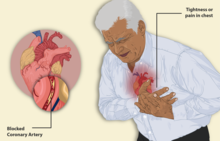| Variant angina | |
|---|---|
| Other names | Prinzmetal's angina, vasospastic angina[1] |
 | |
| Illustration depicting angina | |
| Specialty | Cardiology |
Variant angina, also known as Prinzmetal angina, vasospastic angina, angina inversa, coronary vessel spasm, or coronary artery vasospasm,[2] is a syndrome typically consisting of angina (cardiac chest pain). Variant angina differs from stable angina in that it commonly occurs in individuals who are at rest or even asleep, whereas stable angina is generally triggered by exertion or intense exercise. Variant angina is caused by vasospasm, a narrowing of the coronary arteries due to contraction of the heart's smooth muscle tissue in the vessel walls.[3] In comparison, stable angina is caused by the permanent occlusion of these vessels by atherosclerosis, which is the buildup of fatty plaque and hardening of the arteries.[4]
- ^ "Variant Angina". www.escardio.org. Retrieved 2 April 2018.
- ^ "Prinzmetal's or Prinzmetal Angina, Variant Angina and Angina Inversa". American Heart Association. 31 July 2015. Archived from the original on 29 August 2022. Retrieved 29 August 2022.
- ^ Wu, Taixiang; Chen, Xiyang; Deng, Lei (24 November 2017). "Beta-blockers for unstable angina". Cochrane Database of Systematic Reviews. 2017 (11): CD007050. doi:10.1002/14651858.cd007050.pub2. PMC 6486012.
- ^ Ahmed B, Creager MA (April 2017). "Alternative causes of myocardial ischemia in women: An update on spontaneous coronary artery dissection, vasospastic angina and coronary microvascular dysfunction". Vascular Medicine (London, England). 22 (2): 146–160. doi:10.1177/1358863X16686410. PMID 28429664.